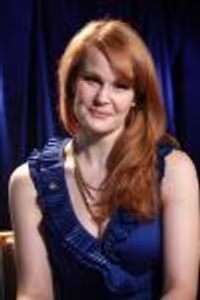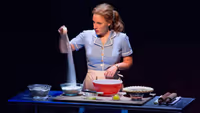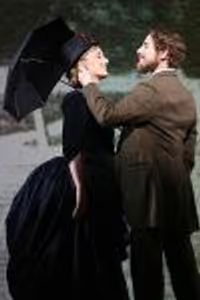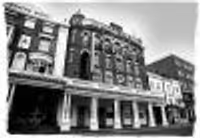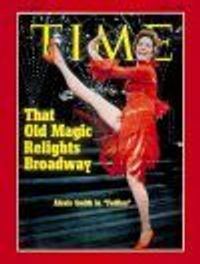THE HEIDI CHRONICLES Previews
#50THE HEIDI CHRONICLES Previews
Posted: 3/9/15 at 10:18am
Well, since somebody asked for a woman to weigh in...
I'll be upfront and say I am of a generation much younger than the one depicted in The Heidi Chronicles (I'm 24). I can absolutely understand why, when the play was written, it was radical in its depictions of women and feminism. I wouldn't necessarily say the play is dated, but more than two decades have passed since it was written and using the word "feminist" in a positive context is becoming less and less rare. The scene that struck the biggest chord for me was the television interview, in which both Peter and Scoop talk over Heidi and barely allow her to speak at all and, in fact, attempt to speak for her. That's certainly something I have experienced in my life, particularly in academia but in other realms as well.
I think feminism has become more intersectional in the years since Heidi Chronicles was written. The play is very much about middle- to upper-class white women (and I know one of the actresses in the play happens to be Asian but there isn't anything in the script that indicates that she has to be and hers is still a very privileged life), and I think since the advent of different depictions of women in popular culture like Orange is the New Black it feels like we've seen Heidi's story told before.
I did really enjoy the play and many of the issues it brings up are still absolutely valid today but the way in which they're presented is the part of the play that's perhaps a little dated.
#51THE HEIDI CHRONICLES Previews
Posted: 3/9/15 at 11:28amWas this play ever actually considered "radical"? Perhaps different or innovative, but it's a fairly standard play with some pretty typical/recognizable characters even for the 1980s. I keep going back to Churchill, which may be unfair to Wasserstein, but something like CLOUD 9 or TOP GIRLS was much more "radical" at the time than THE HEIDI CHRONICLES.
#52THE HEIDI CHRONICLES Previews
Posted: 3/9/15 at 12:17pmPerhaps radical wasn't the right word, but I think it was still less common to see such outward declarations in support of feminism (that actually used the word feminist/feminism) than it is today.
MegInManhattan
Stand-by Joined: 3/10/14
#53THE HEIDI CHRONICLES Previews
Posted: 3/9/15 at 2:08pm
I saw the play on Friday and loved it! Re the "dated" debate: I was shocked at how NOT dated it felt. And it's kind of amazing that a play that was exploring this "women having it all" message 25+ years ago still felt so current. How little progress have we made? Or was the play just that ahead of its time?
Agree about the cultural references though. A lot of them went over my head. At 30, I seemed to be the youngest person in the audience. Mostly women 55+, which I suppose is statistically the average age for a Broadway patron, but this was one of the least age-diverse audiences that I've ever seen. Seemed that a lot of women were of the Boomer generation and wanted to re-live a favorite relateable
play.
Loved Elizabeth Moss and her "locker room" monologue. Her sadness and loneliness hit pretty close to home with having a lot accomplishments and most of what you wanted in life and yet it doesn't fulfill you. Jason Biggs was pretty good, I think we're trained to not like the character so maybe hard to embrace him. I'm torn on what to think of Bryce Pinkham. At times I loved him (the hospital scene), and at times I thought it got caricature-ish. He did best with the emotional moments.
Overall I loved it though! But will be a tough year in the best-revival category and don't think this will be a front-runner. Moss will likely get an acting nom, but unfortunately won't beat Mirren.
#54THE HEIDI CHRONICLES Previews
Posted: 3/13/15 at 2:17pm
I saw this last night and thoroughly enjoyed it. I got a rear mezz ticket through TodayTix and was happy to be in the center of the mezzanine, which was probably less than half full. There were two completely empty rows in the middle of the center mezz.
This was a good thing because I had to move at intermission because the two girls behind me (mid-20's) kept making dumb comments when they appreciated something or it perhaps related to an inside joke. So childish, it's not your living room. I took solace when they didn't laugh at cultural references that I got and I'm 32.
I'll admit that I didn't get a couple references, but I understood most and appreciated the comedy. I didn't find the material in the play to be dated. It felt incredibly relevant given the frequent discussion of "women having it all" these days - women my age seem to still be facing pressures felt by our mothers. I connected to it by thinking about my own mom's experience (she's the same age as Heidi) as a successful businesswoman and mother.
I thought Elisabeth Moss did a wonderful job with the role. She captured the audience early during the opening "lecture" scene and kept our attention. Bryce Pinkham was a delight and both of his big one-on-one scenes with Moss brought tears to my eyes. I'm not a real Jason Biggs fan but I tried to go into this with a clean slate. He was just okay. I was much more emotionally & invested in Heidi & Peter's relationship than Heidi & Scoop.
Seems like they are ready for opening night. The audience last night was kind of strange, sometimes not applauding at the end of scenes, etc. Glad I saw it and I'll be curious to hear the reviews.
neonlightsxo
Broadway Legend Joined: 7/29/08
#55THE HEIDI CHRONICLES Previews
Posted: 3/13/15 at 2:23pm
I loved this production as well. I did not find it dated at all. The conversations about feminism are the conversations we are still having.
Bryce will be nominated for a Tony. I hope Tracee Chimo can snag a nomination too. People have been nominated for less.
I enjoyed Jason Biggs and thought he was well cast, but he had no chemistry with Elisabeth (who was fantastic, btw.)
#56THE HEIDI CHRONICLES Previews
Posted: 3/14/15 at 9:05pm
Ok, I saw this today, and I can't say I'm particularly impressed. I had read the across-the-board opinions on this thread, and had no idea whether I'd like it or not, so I went in with an open mind. It had its good moments. I particularly liked the television scene, the big monologue, and the hospital scene. The rest of it wasn't horrible, but also not very good. Way too long, in my opinion. Also, to me it doesn't feel outdated at all. It's not very GOOD, but I don't think being outdated is among its issues.
Elizabeth Moss is giving a great performance, definitely worthy of a Tony nod in my opinion. Bryce Pinkham is also great, but goes a little over the top at points. Jason Biggs is doing a serviceable job. I don't think he's giving a very memorable performance, but in my opinion he's doing as well as can be expected in that role. The supporting actors are also doing pretty well, but I don't think their roles are very well-written.
For those wondering, I got to the rush this morning at 9:00 and was the 3rd party in line (2 pairs of people in front of me), and I got matinee tickets easily. By 10:00 there were about 10 or so people behind me. The seats were all in the front row, and were pretty good, but not for everyone. I personally enjoy sitting really close, and I don't mind having to look up, but if you're not a fan of neck-craning, these seats are not for you. Everything was pretty visible except the actors' shoes, and the bottom of the upstage doorways. I definitely didn't miss anything though.
Updated On: 3/14/15 at 09:05 PM
#57THE HEIDI CHRONICLES Previews
Posted: 3/14/15 at 9:19pmJBroadway - your comment on the length reminded me that I neglected to mention that in my notes. My issue with the length was more of certain scenes. It's not so much that I would cut anything scene entirely but some of the dialogue was just rambling and I felt there were scenes that could really be made shorter.
#58THE HEIDI CHRONICLES Previews
Posted: 3/14/15 at 10:14pm^For the most part, I agree. I could have done without a few of those scenes, but I agree that many of them could have been much shorter without losing any effectiveness.
#59THE HEIDI CHRONICLES Previews
Posted: 3/14/15 at 10:42pm
"It's not very GOOD, but I don't think being outdated is among its issues."
And therein lies the real source of the debate: not the play's sociopolitical POV or agenda (or perception thereof) but its craft and ability to fully engage for 2 1/2 hours. The two issues keep getting conflated, with a presumption of their intersection/overlap, as if the still very relevant feminist concerns are somehow playwriting concerns. Very different matters, and many of the strictly craft (and maybe character) questions were debated in the 80s. I personally wish the play had more drive, more of a thrust to push us toward its admittedly moving catharsis and resolution. I've never felt that the first act adequately sets up the final 20 minutes, and having re-read it last week, still feel that way. Yet I feel every single sociopolitical issue the story touches on feels as pertinent. I will be curious to read the formal reception, whether critics address the play as a (successful) play as much as a pivotal lightning rod.
#60THE HEIDI CHRONICLES Previews
Posted: 3/15/15 at 1:06amAgreed Auggie. I felt, as an audience member, no driving force. It's kind of a character study, but it fails in that sense since we never really get to know Heidi too well. I just wanted it to be better than it was.
electrode10
Stand-by Joined: 3/28/08
#61THE HEIDI CHRONICLES Previews
Posted: 3/15/15 at 10:06am
RippedMan, I agree. I felt a lot of time was spent building and observing Heidi's friends around her. By the time we get to her locker room breakdown, I found it hard to feel for her. Bryce's Peter, however, almost moved me to tears at more than one point in the evening.
I do agree with some other posters about the length - some parts did seem to ramble on. That being said, it was still an enjoyable night at the theatre. Jumped on the train on a whim and bought $40 mezz tickets 30 minutes before curtain and don't regret the decision. (The same can't be said for my last evening at It's Only A Play, but I digress.)
#62THE HEIDI CHRONICLES Previews
Posted: 3/18/15 at 8:34pm
I attended a preview performance last night. I also saw Brooke Adams as Heidi when she succeeded Joan Allen in the role. Seeing this when I was very young, I was scared by the cautionary tale it told. This was almost 30 years ago before women hit their stride. Heidi's fearfulness that her career would be one more drowned by the patriarchy despite her education, wit, hard work, and humanity was palpable. The context of the times is crucial to remember in order to respect this work. This was before America's first woman attorney general (Janet Reno 1990s), secretary of state (Madeleine Albright 1990s), the first woman won a Tony for directing a play, the first woman won an Oscar for directing a movie - NONE of this happened at the time Wasserstein wrote this play. For Pete's sake, Hillary Clinton, in her mid-40s at this point, was fighting against being put in the box of someone's "wife."
With that in mind, this play is a precious museum piece. It's too dependent on where history was at that time (1988/89) to make it timeless. In the direction, the cultural signifiers were blatant to the point of condescension - see audience: these are newspaper headlines and images from 1968, this is what Urban Outfitter tells you people wore then, and this is the song from Kasey Kasem's Top 40. I was surprised by how heavy-handed that was. But reading some comments here I guess Wasserstein's references in the script expired. Bertrand Russell?
Most of all I was let down by the direction of Elisabeth Moss and her performance. Heidi's monologues at the lectern set in motion her doubt that her students will take the women shown on the slides seriously, should build to her sarcastic remarks about them, and climax with her doubts and anger turned on herself at the alumnae luncheon. Rather, Moss giggled through the monologues and played it girlish and cutesy. Ask a seasoned Boomer woman - working extra hard to be taken seriously wasn't fun or dignified. Look at Heidi on the Good Morning NY set. It was humiliating at times but you forged ahead and you didn't giggle not even if your life depended on it. If played correctly those three moments should escalate Heidi's crisis.
I wonder why "The Heidi Chronicles" was revived? Why did Lincoln Center choose to produce this on Broadway when it would have worked better in the intimate Vivian Beaumont Theater? This production is a disservice to Wasserstein's milestone thesis when she says aloud to her sisters in the struggle "I feel stranded ... I thought the point of this was we were all in it together." That accusation and confession stunned in the late 1980s.
Bryce - scene stealer and I loved his chemistry with Moss on the bench outside the Chicago art museum.
Jason Biggs - no, poor casting. Scoop must be the hot guy who was wrong for you then and still now but he still gives you tingles.
Updated On: 3/18/15 at 08:34 PM
#63THE HEIDI CHRONICLES Previews
Posted: 3/19/15 at 3:32pm
Well, before the critics weigh in tonight, here's one more opinion. A play about feminism, that I didn't think was very well written 25 years ago, and its author wildly overpraised for all her plays, should still make some dramatic sense, especially if it is this long. But neither the writing (a gay best friend? perhaps meaningful then, but not today), nor the very unengaging performances (love Moss, but she seemed very outside the role, and often seemed no more than a cipher in the center of a series of "historical" events) make this a necessary trip to the theatre.
Now let the "professionals" tell us what to think (we have the Times and the Pulitzer people to thank for its original success)...
neonlightsxo
Broadway Legend Joined: 7/29/08
#64THE HEIDI CHRONICLES Previews
Posted: 3/19/15 at 4:13pm
"Why did Lincoln Center choose to produce this on Broadway when it would have worked better in the intimate Vivian Beaumont Theater?"
It's not a Lincoln Center production and I have no idea where you got the idea that it is. It's a commercial production by Jeffrey Richards and Jerry Frankel.
Updated On: 3/19/15 at 04:13 PM
Videos


